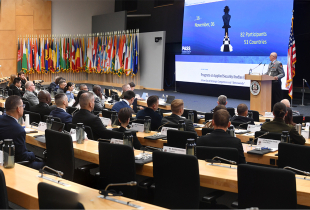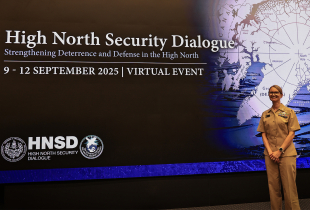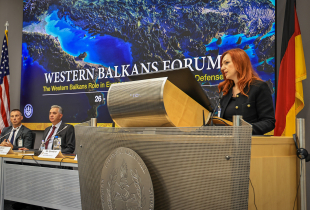
Marshall Center’s European Security Seminar – South Tackles Demographic Change in the MENA Region
By Christine June
Public Affairs Office
George C. Marshall European Center for Security Studies
GARMISCH-PARTENKIRCHEN, Germany (March 23, 2018) – The Marshall Center hosted the European Security Seminar – South (ESS-S 18-06) “Demographic Change and the Youth in the Middle East and North Africa (MENA) Region – Issues of Human or National Security?” from March 19 to 23.
“This year’s European Security Seminar – South covers the demographic factor in the Southern Flank, which is one of the key challenges or problems of the region,” said ESS-S Director Prof. Dr. Ralf Roloff, who is also Marshall Center’s Deputy Dean for Resident Programs at the College of International and Security Studies. “This week, we looked into how to develop the opportunities, and what are the challenges and security issues related with the demographic factor.”
Human Security or National Security
He added that they discussed whether this factor was more of an issue for human security or national security, and what that it means for the security situation in the Southern Flank.
“It sounds very theoretical, but it’s a very, very timely and very practical topic, as we were discussing this issue this week…it was still a ticking bomb,” Roloff said. “Therefore, this really is a key issue that we discussed this week.”
The 64 participants from 33 nations examined the threats to Europe emanating from the Middle East and North Africa or MENA Region and developed appropriate responses to regional security challenges.
“We looked into the implications of demographic change in the MENA region on the youth, and investigated the impacts on human, national and regional security,” Roloff said.
Wealth of Experience, Knowledge
Subject matter experts from the Marshall Center, adjunct professors and guest lecturers from national and international European and Euro-Atlantic security organizations presented on topics covering the demographic factor from human and national insecurity today to national and multilateral approaches to counter youth problems.
Speakers and participants were representatives of the European Union, Mediterranean Union, and NATO and its Partner for Peace Program, Mediterranean Dialogue and Istanbul Cooperation Initiative.
Participants hailed from: Albania; Algeria; Australia; Bosnia and Herzegovina; Bulgaria; Croatia; Cyprus; Egypt; Estonia; France; Georgia; Germany; Greece; Italy; Kazakhstan; Kosovo; Lebanon; Lithuania; Macedonia; Mali: Malta; Montenegro; Morocco; Nigeria; Pakistan; Romania; Serbia; Spain; Tunisia; Turkmenistan; Uganda; United States; and, Uzbekistan.
They worked in their ministries of defense, foreign affairs, interior, internal security, justice, legislative, and military, police and international organizations.
Capturing Insights to Inform Strategy
Roloff said that this seminar was designed in such a way as to capture the insights from these representatives as to how the EU and NATO can formulate new strategies toward the Southern flank while minimizing negative spillovers and collateral damage to NATO and EU neighbors and partners in the region.
He said that the final results of the ESS-South will be published as a conference report or what is called the Marshall Center Insights.
“These insights will be fed back through to the U.S. and Germany, and EU and NATO, and those involved in the Africa strategic discussion in order to inform strategy,” Roloff said.


